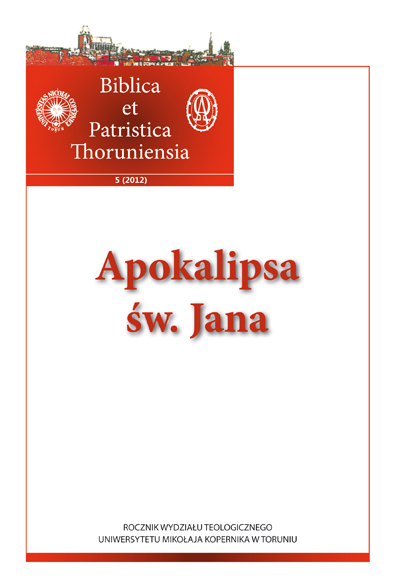Wpływy greckie w Apokalipsie św. Jana
DOI:
https://doi.org/10.12775/BPTh.2012.006Słowa kluczowe
Apokalipsa, hellenizacja chrześcijaństwa, wpływy greckie w Biblii, apokaliptyka, mitologiaAbstrakt
Apokalipsa odwołuje się zatem do kosmologii bliskowschodniej, przedstawiając niebo, ziemię i czeluść. Ożywia znany z archaicznych mitów motyw kosmicznego starcia sił dobra i zła. Korzysta zarazem z wątków greckich: atak potwora na kobietę i nowo narodzone dziecko (Latona i Apollo; Ap 12); cztery żywioły (Ap 16); klucze otchłani (Ap 1, 18); symbolika ciał niebieskich (Ap 1, 20; 22, 16). Przedstawia hybrydy zwierzęce, motyw mityczny (choć przejęty z Księgi Daniela).
Wykorzystano je jednak jako przyjęte w ówczesnej kulturze symbole, bez ulegania pogańskim wierzeniom (metoda podobna, jak w Rdz 1-11). Równolegle wykorzystano inne typy popularnej symboliki. Z drugiej strony mitologiczne przedstawienie potworów w Ap 13 dowodzi tendencji do polemiki z mitem, albo też do przewartościowania mitów zastanych, do budowania „nowej mitologii”. Inny przykład polemiki, to aluzje do kultu cesarskiego. Ten kult stanowi tło Apokalipsy, ale trudno mówić w tym przypadku o wpływie.
Jeśli chodzi o wpływy filozoficzne, mniej wyraźne, choć postulowane, z platonizmem można wiązać jaskrawe odróżnienie przyszłego, niebiańskiego i świetlistego świata od ziemi (Ap 21). Stoickie przewidywanie co do „zognienia” świata mogło zabarwić zapowiedzi zniszczenia w ogniu. Rygorystyczna etyka Ap 2-3 też może mieć inspirację stoicką, a nazywanie doskonałego „zwycięzcą” ma odpowiednik u Epikteta (Diatryby 1, 18, 22). Pitagorejczycy interesowali się symboliką liczb, ważną dla Apokalipsy. Wymieńmy 3 (symbol całości), 4 (świata i sprawiedliwości), 7 (święta i doskonała) i 10 (pełnia); i tu jednak inspiracją dla Apokalipsy mogła być Księga Daniela.
Bibliografia
Andresen C., Antike und Christentum, „Theologische Realenzyklopadie”, t. 3, 1978, s. 50–99.
Aune D. E., Revelation, t. 1–3, Word Biblical Commentary 52A–C, Dallas 1997–1998.
Aune D. E., The New Testament in Its Literary Environment, Cambridge 1988.
Barrett C. K. (red.), The New Testament Background. Writings from Ancient Greece and the Roman Empire That Illuminate Christian Origins, London 1987.
Beale G. K., The Book of Revelation (New International Greek Testament Commentary), Grand Rapids-Carlisle 1999.
Berger K., Hellenistische Gattungen in Neuen Testament, ANRW II/25.2 (1984): 1031–1432, 1832–1885.
Betz H. D., Antiquity and Christianity, JBL 117 (1998)1, s. 3–23.
Betz H. D., The Birth of Christianity as a Hellenistic Religion: Three Theories of Origin, “Journal of Religion”74 (1994), s. 1–25.
Böcher O., Hellenistisches in der Apokalypse des Johannes, w: Geschichte – Tradition –Reflexion, Fs. M. Hengel, t. 3, red. H. Lichtenberger, Tubingen 1996, s. 473–492.
Busch P., Der gefallene Drache. Mythenexegese am Beispiel von Apokalypse 12, Texte und Arbeiten zum neutestamentlichen Zeitalter 19, Tubingen 1996.
Clemen C., Religionsgeschichtliche Erklarung des Neuen Testaments, Berlin 1924.
Colish M . L., Stoicism and the New Testament, ANRW II/26.1 (1992), 334–379.
Collins J. J., Between Athens and Jerusalem, wyd. 2, Grand Rapids 2000.
Dormeyer D., Das Neue Testament im Rahmen der antiken Literaturgeschichte, Darmstadt 1993.
Feldman L. H., Jew and Gentile in the Ancient World, Princeton 1996.
Hengel M., Judentum und Hellenismus, wyd. 2, Tubingen 1973 (przekład ang. z 1974, Judaism and Hellenism).
Hessen J., Griechische oder biblische Theologie? Das Problem der Hellenisierung des Christentums in neuer Beleuchtung, wyd. 2, Munchen 1962.
Judge E. A., ‘Antike und Christentum’: Towards a Definition of the Field. A Bibliographical Study, ANRW II/23.1, Berlin–New York 1979, s. 3–58.
Kiejdo K., Księga Daniela jako przykład hellenistycznych wpływow na kulturę Izraela, diss. Wydział Teologii UWM, Olsztyn 2011.
Malherbe A. J., Hellenistic Moralists and the New Testament, ANRW II/26.1 (1992), s. 267–333.
Meleze Modrzejewski J., Żydzi nad Nilem od Ramzesa II do Hadriana, Kraków 2000.
Neuer Wettstein. Texte zum neuen Testament aus Griechentum und Hellenismus, 3 t., Berlin 2001–.
Scheffczyk L., Tendenzen und Brennpunkte der neueren Problematik um die Hellenisierung des Christentums, Munchen 1982.
Sterling G. E., Hellenistic Philosophy and the New Testament, w: Handbook to Exegesis of the New Testament, S.E. Porter (red.), New Testament Tools and Studies 25, s. 313–358.
Tcherikover V., Hellenistic Civilization and the Jews, Philadelphia 1959.
Wendland P., Die hellenistisch-romische Kultur in ihren Beziehungen zum Judentum und Christentum, Handbuch zum Neuen Testament 2, wyd. 4 zmienione, Tubingen 1972.
Zieliński T., Hellenizm a judaizm, Warszawa 1927 (wyd. nowe Toruń 2001).
Pobrania
Opublikowane
Jak cytować
Numer
Dział
Licencja
CC BY ND 4.0. Posiadaczem prawa autorskiego (Licencjodawcą) jest Autor, który na mocy umowy licencyjnej udziela nieodpłatnie prawa do eksploatacji dzieła na polach wskazanych w umowie.
- Licencjodawca udziela Licencjobiorcy licencji niewyłącznej na korzystanie z Utworu/przedmiotu prawa pokrewnego w następujących polach eksploatacji: a) utrwalanie Utworu/przedmiotu prawa pokrewnego; b) reprodukowanie (zwielokrotnienie) Utworu/przedmiotu prawa pokrewnego drukiem i techniką cyfrową (e-book, audiobook); c) wprowadzania do obrotu egzemplarzy zwielokrotnionego Utworu/przedmiotu prawa pokrewnego; d) wprowadzenie Utworu/przedmiotu prawa pokrewnego do pamięci komputera; e) rozpowszechnianie utworu w wersji elektronicznej w formule open access na licencji Creative Commons (CC BY-ND 3.0) poprzez platformę cyfrową Wydawnictwa Naukowego UMK oraz repozytorium UMK.
- Korzystanie przez Licencjobiorcę z utrwalonego Utworu ww. polach nie jest ograniczone czasowo ilościowo i terytorialnie.
- Licencjodawca udziela Licencjobiorcy licencji do Utworu/przedmiotu prawa pokrewnego nieodpłatnie na czas nieokreślony
PEŁEN TEKST UMOWY LICENCYJNEJ >>
Statystyki
Liczba wyświetleń i pobrań: 805
Liczba cytowań: 0



